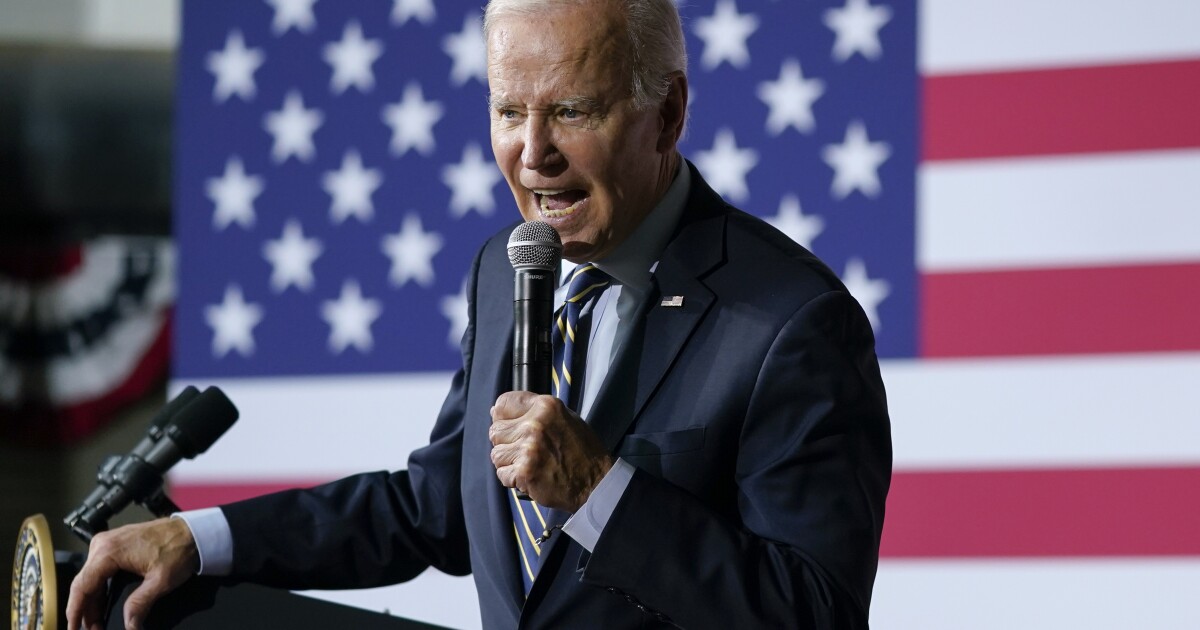

Under the threat of a default, the White House and House Republicans have engaged in a war of words over raising the country’s $31.4 trillion debt ceiling before the summer.
But as each seeks to avoid being pinned down for any negative consequences of their protracted negotiations, including a credit rating downgrade, the target audience of their rhetoric, their constituents, do not appear to be paying attention — yet.
BIDEN AND MCCARTHY ENTER THE NEXT PHASE OF THEIR DEBT CEILING SHOWDOWN
The White House unleashed on House Republicans this week after Speaker Kevin McCarthy (R-CA) announced his conditions for raising the debt ceiling. But as he tries to coalesce his conference, a very narrow majority, around his proposal before putting it to a vote on the House floor next week, the country’s borrowing authority “is not of much concern to the public, at this point,” according to Director Barry Burden of the University of Wisconsin-Madison’s Elections Research Center.
Even in Wisconsin, which hosted a highly anticipated state Supreme Court election this month, gun control, abortion access, and even space exploration are receiving “more attention and are more tangible to people’s everyday lives,” Burden told the Washington Examiner.
“The debt limit is certain to rise in prominence as the U.S. government runs up against it,” he said. “Party leaders are essentially formulating strategies and lining up potential coalitions now that can be activated when the time comes.”
Those strategies include McCarthy proposing to raise the debt ceiling by $1.5 trillion or until March, whichever comes first, in exchange for returning discretionary spending to fiscal 2022 levels, capping budget increases at 1% a year, redirecting untapped COVID-19 funds, repealing President Joe Biden‘s Inflation Reduction Act IRS and green tax credit provisions, passing House Republicans’ Lower Energy Costs Act, and ending the president’s student loan forgiveness programs. But as the speaker attempts to amass 218 votes from his four-member majority that elected him in 15 ballots, the measure is set to morph.
The White House responded a day later, releasing an embargoed statement from press secretary Karine Jean-Pierre and, later, a more detailed memo from spokesman Andrew Bates.
“Yesterday, Speaker McCarthy unveiled his ransom demands for not triggering a catastrophic default and sending the U.S. economy into a needless, unprecedented tailspin that kills millions of jobs,” Bates wrote Thursday. “It’s a 320-page plan that would take a two-by-four — on behalf of China — to America’s manufacturing resurgence by repealing the Inflation Reduction Act’s clean energy tax credits.”
Amid battleground polling conducted before next year’s elections that found a higher percentage of respondents consider McCarthy to be dealing with the White House in good faith than not, Bates identified specific House Republicans whose districts have or will benefit from Inflation Reduction Act spending.
“Will Rep. Marjorie Taylor Greene (R-GA) vote to eliminate the investments helping to create 2,500 solar manufacturing jobs in her district?” he asked. “Will Rep. Joe Wilson (R-SC) vote to rip tax credits away from a $2 billion [electric vehicle] manufacturing investment in his district? Will Rep. Mike Carey (R-OH) risk the more than 2,000 EV investment-related jobs coming to his district?”
Jean-Pierre, who in her statement accused House Republicans of “playing economic brinkmanship with the American people’s livelihoods and retirements,” was defiant during her briefing when reporters needled her on why Biden was declining to meet with McCarthy, with all that is at stake.
Biden has not sat down with McCarthy since February, one month after the country reached the debt ceiling. But Jean-Pierre did not rule out the prospect of another discussion, promising the White House would “analyze what they put forward to us, and we’ll have more to share.”
“It is not the president that’s risking this. It is Congress that is risking this,” she said. “It is up to them to get this done. They are wasting time.”
The White House is adamant House Republicans should raise the debt ceiling, as they did three times during former President Donald Trump‘s administration. GOP lawmakers are insistent that they want to cut spending in order to do so, with the White House pushing back about what that means in practice.
But although the White House is convinced it retains the moral high ground, with Congress being held responsible for the 2011 debt ceiling credit rating downgrade, Jean-Pierre was forced to defend Biden from criticism from Democrats, including Sen. Joe Manchin (D-WV), who has scrutinized Biden’s “deficiency of leadership” on the issue.
CLICK HERE TO READ MORE FROM THE WASHINGTON EXAMINER
“We have a strong and productive relationship with Sen. Manchin,” she said. “He’s someone that we have been able to, the president has been able to pass some historic pieces of legislation. … The president and Sen. Manchin agree we must avoid default.”
Reps. Dean Phillips (D-MN) and Haley Stevens (D-MI) have similarly complained, with Phillips telling Axios negotiation is “what this whole institution is about.”





